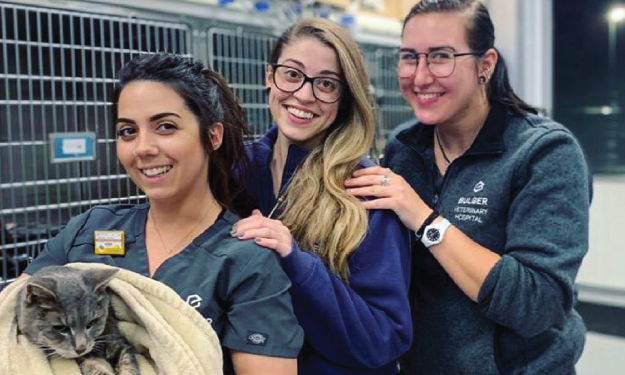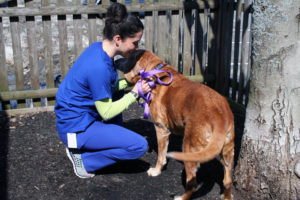Animal Veterinary Health Technicians

During the second week of October we celebrate and thank our veterinary technicians. National Veterinary Technician Week is a perfect time to thank the hardworking and dedicated technicians you have contact with. Here at Ethos, we are fortunate to have over 290 veterinary technicians and assistants working with us across our 7 hospitals in the northeast. Each and every one gives 110% every day to care for those who have no voice and can’t tell you what’s wrong. It can be emotional and draining, but our technicians say it is their calling and has its own beautiful rewards.
So what is a veterinary technician and what does it mean to some of our own? Below you will see personal accounts and definitions of what being a veterinary technician means.

Giselle was promoted to Hospital Service Manager
Giselle Trainor, BS, CVT
Being a Vet Tech means a lot of different things. Human nurses are separated into different titles, departments, specific tasks whereas the general vet tech needs to be many things: an anesthetist, phlebotomy and IV access technician, pediatric and geriatric nurse, and so much more with only two to four years of education. In addition to the nursing care there is the patience required to effectively communicate and train others. We constantly are educating each other on the job as well as owners to provide the best care for our patients that can’t advocate for themselves. Technicians have to be ingenious and creative to come up with solutions for overwhelmed clients, busy or short staffed days, and difficult patients. We do it all, and we do it for multiple species. There are moments of sadness, joy, frustration, stress… sometimes all within the same day. It is not always an easy job by any means and we often have to put aside our needs for those of our patients. But, when you see that patient no one thought would make it go home to it’s owner, or make a connection with a special client and their pet and know that your hard work and sacrifice made a difference, it’s all worth it.

Marisa is the Internal Medicine technician at Bulger. Her favorite part of being a technician is seeing a patient through their disease and help them to recovery.
Marisa Lacopino, BS
In human medicine, doctors have nurses, in veterinary medicine, doctors have technicians. Whether it be a 2 year or a 4 year program, a technician versus a technologist, there is no quick way to get the education needed to become a tech. You have to be ready and willing to put in the time, the effort and the dedication. Being a tech goes far beyond ones love for animals and all things cute and cuddly. The daily tasks that a tech performs involves things far from any of that (but yes, we do get our fill of all those cute and cuddly creatures too!) The things we do as technicians are things that most people have never even fathomed (hopefully!). From a yearly appointment with the fractious, fearful patient that we have to magically get a muzzle on and restrain while the doctor does an exam and then get blood from, to the emergencies that keep coming in. No day is a routine work day for us. The job of a technician requires a passion for what we do and requires dedication, compassion, hard work and a sense of humor to name a few; laughter is the best medicine! We deal with a great amount of sadness in this field and saying good-bye to a patient can be a daily occurrence for us. There are times when we are the final voice that tells a patient it will be okay, the final hand that gently rubs a head before taking his/her final breathe, and this is never an easy thing, whether it is for the first time or for the millionth. No matter the severity of the case, we as technicians need to wipe away the tears and console grieving clients, as well as one another. All within a single shift there is the potential for us to laugh, to cry, to show frustrations and to sometimes even have to step away to regain composure. Being in a field where you have to work closely with many team members means you are never alone. The relationships you gain between fellow technicians, doctors, client care, etc are ones that have been built on many emotions and support. We all experience such a variety of these emotions on a day to day basis and are able to get through them together as a team, or in some cases like mine, as a work family.
Being a veterinary technician is not an easy job. It is not a job where one can give 50% throughout any given day. We have to be the best we can be everyday for those patients. When someone asks what we do I think the most accurate response would be a list of what we cannot do: make a diagnosis, perform surgery or prescribe medications. I could go on and say what we do, but not only would that take up too much time and space, but I actually don’t think I could give all the technicians out there enough credit for what they do. I love the career that I have chosen for myself, it is one that allows you to learn new things, learn new ways and grow as a human being. With all the sadness that we do see, there is the other side that is sweet and rewarding.

Tracey was the 2013 MVTA Veterinary Technician of the Year.
Tracey Warren, BS, CVT
I started working at a general veterinary practice when I was 16. I knew right away that entering the veterinary world was something I wanted to do. I decided to apply to a few veterinary technology schools and decided Mount Ida College was the best choice for me. Associates Degree Programs at the accredited schools for veterinary technology are either 2 or 3 years and obtaining your Bachelor Degree is another 1-2 depending on the college. I received both, and in 1999, took the very challenging, Veterinary Technician National Exam (VTNE) and earned the status of Certified Veterinary Technician (CVT) upon passing. Becoming a Certified Veterinary Technician is very similar to becoming an RN in the human field. We also need to keep up with our continuing education and obtain 12 CE credits yearly.
While I have worked in several different areas of veterinary medicine, the last 10+ years I have spent my time in Neurology at Mass Vet, and in the last few years, shelter medicine on the weekends. A typical weekday on the floor in Neurology I am drawing blood from various vessels, performing cystocentesis, placing intravenous catheters, taking radiographs, intubating dogs and cats, inducing and monitoring anesthesia during MRI, CT scans, and brain and spinal surgery. We also spend a portion of our day educating clients on the phone and in person, and counseling them on their pet’s condition. On a Saturday, you will find me calculating drugs, pre-medicating, intubating and monitoring anesthesia on 25-30 dogs at the local animal shelter. Working in both places is extremely rewarding for different reasons.
Being a Certified Veterinary Technician comes with a lot of opportunity and opens doors for working in various areas. In my 15+ years since obtaining my certification, I have got to partake in opportunities such as teaching at Mount Ida College, speaking to various groups on careers in veterinary medicine, going on a charitable trip to the Dominican Republic to help spay/neuter hundreds of animals, working as an adjunct veterinary technician with a veterinary hospice group, going to veterinary conferences all over the US, and also currently working as a Floor Supervisor and Veterinary Technician Internship Coordinator for students enrolled in the various vet tech schools in, and outside of, New England.
If you are interested in working in veterinary medicine but aren’t sure if you want to become a Veterinary Technician, there is also an opportunity to become an Approved Veterinary Assistant (AVA) and there are several programs available depending on where you live. You would work under the Certified Veterinary Technicians and also with the Veterinarians. For those technicians that are certified, and have been working in a designated area for a lengthy amount of time, (variable based on the Academy), you can go through the rigorous process of becoming a Veterinary Technician Specialist (VTS). This is an extremely challenging endeavor and certainly a rewarding one! This can be obtained in almost any area of veterinary medicine at this point: Neurology, Anesthesia, Nutrition, Dentistry, Emergency, and more.
I encourage everyone to visit the NAVTA (National Association of Veterinary Technicians in America) website and also your state association to learn more about becoming an Approved Veterinary Assistant, Certified Veterinary Technician, or a Veterinary Technician Specialist.

Alysha is a veterinary assistant at Capital District Veterinary Referral Hospital
Alysha Serna, Veterinary Assistant
I believe that being a veterinary assistant is one of the hardest jobs in the veterinary field, while also being the most rewarding. Although the technicians spend a lot of time with the patients, it is the assistants that are able to interact with them more on a personal level as opposed to a medical level. The connection we build with patients is what makes me want to continue to work in this field. I find assistants can take the time to get the scared and anxious patients to relax, focus on comforting them to go to the bathroom in an unfamiliar place and coax them to eat when their appetite is the determining factor on them being able to go home. Since assistants do spend so much time with the patients, it makes it that much harder to cope if they unfortunately do not make it through their treatment- in knowing this, a strong love for the job is necessary. Knowing that not every patient wins their fight makes it that much more rewarding when all of the hard work, time and dedication spent with a patient was a key to their success in going home.